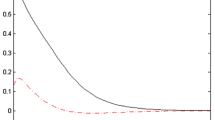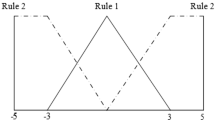Abstract
This paper investigates a fuzzy controller design method for discrete-time nonlinear stochastic time-delay systems which are presented by the Takagi-Sugeno (T-S) fuzzy model with multiplicative noises. Utilizing the proposed design method, the fuzzy controller can be carried out via not only state feedback scheme but also output feedback scheme. Both of them are accomplished by the concept of imperfect premise matching (IPM). For discussing the stabilization problem, the Lyapunov-Krasovskii function and passivity theory are applied to derive the sufficient conditions. Moreover, the discrete Jensen inequality is employed to decrease the conservatism of the proposed method. Finally, a numerical example for the control of a nonlinear time-delay pendulum system is provided to show the effectiveness and usefulness of the proposed design method.
Similar content being viewed by others
References
H. O. Wang, K. Tanaka, and M. F. Griffin, “An approach to fuzzy control of nonlinear systems: stability and design issues,” IEEE Trans. Fuzzy Syst., vol. 4, no. 1, pp. 14–23, February 1996.
M. Nachidi, A. Benzaouia, F. Tadeo, and M. A. Rami, “LMI-based approach for output-feedback stabilization for discrete-time Takagi-Sugeno systems,” IEEE Trans. Fuzzy Syst., vol. 16, no. 5, pp. 1188–1196, October 2008.
W. J. Chang and W. Chang, “Discrete fuzzy control of time-delay affine Takagi-Sugeno fuzzy models with H ∞ constraint,” IEE Proceeding, Part D, Control Theory and Applications, vol. 153, no. 6, pp. 745–752, November 2006.
J. Dong and G. H. Yang, “H ∞ Controller synthesis via switched PDC scheme for discrete-time T-S fuzzy systems,” IEEE Trans. Fuzzy Syst., vol. 17, no. 3, pp. 544–555, June 2009.
W. J. Wang and W. W. Lin, “Decentralized PDC for large-scale T-S fuzzy systems,” IEEE Trans. Fuzzy Syst., vol. 13, no. 6, pp. 779–786, December 2005.
H. K. Lam and M. Narimani, “Stability analysis and performance design for fuzzy-model-based control system under imperfect premise matching,” IEEE Trans. Fuzzy Syst., vol. 17, no. 4, pp. 949–961, August 2009.
C. C. Ku, P. H. Huang, and W. J. Chang “Passive fuzzy controller design for nonlinear systems with multiplicative noises,” Journal of the Franklin Institute — Engineering and Applied Mathematics, vol. 347, no. 5, pp. 732–750, January 2010.
W. J. Chang, C. C. Ku, and P. H. Huang, “Robust fuzzy control for uncertain stochastic time-delay Takagi-Sugeno fuzzy models for achieving passivity,” Fuzzy Sets and Syst., vol. 161, no. 15, pp. 2012–2032, August 2010.
W. J. Chang, C. C. Ku, and P. H. Huang, “Robust fuzzy control via observer feedback for passive stochastic fuzzy systems with time-delay and multiplicative noise,” International Journal of Innovative Computing, Information and Control, vol. 7, no. 1, pp. 345–364, January 2011.
W. J. Chang, W. Y. Wu, and C. C. Ku, “H ∞ constrained fuzzy control via state observer feedback for discrete-time Takagi-Sugeno fuzzy systems with multiplicative noises,” ISA Trans., vol. 50, no. 1, pp. 37–43, January 2011.
G. Eli, S. Uri, and Y. Isaac, H ∞ Control and Estimation of State-Multiplicative Linear Systems, Springer, London, 2005.
M. Wu, Y. He, and J. H. She, Stability Analysis and Robust Control of Time-delay Systems, Springer-Verlag, Berlin, Heidelberg, 2009.
F. O. Souza, L. A. Mozelli, and R. M. Palhares, “On stability and stabilization of T-S fuzzy timedelayed systems,” IEEE Trans. Fuzzy Syst., vol. 17, no. 6, pp. 1450–1455, December 2009.
C. Lin, Q. G. Wang, T. H. Lee, and Y. He, “Design of observer-based H ∞ control for fuzzy time-delay systems,” IEEE Trans. Fuzzy Syst., vol. 16, no. 2, pp. 534–543, April 2008.
W. J. Chang and W. Chang, “Synthesis of nonlinear discrete control systems via time-delay affine Takagi-Sugeno fuzzy models,” ISA Trans., vol. 44, no. 2, pp. 243–257, April 2005.
X. L. Zhu and G. H. Yang, “Jensen inequality approach to stability analysis of discrete-time system with time-varying delay,” Proc. of American Control Conference, pp. 1644–1649, June 2008.
S. Ma and E. K. Boukas, “Stability and robust stabilisation for uncertain discrete stochastic hybrid singular systems with time delay,” Proc. of IET Control Theory and Applications, vol. 3, no. 9, pp. 1217–1225, January 2009.
Z. Ji, Y. Zhou, and Y. Shen, “Stabilization of a class of fuzzy control systems via piecewise fuzzy Lyapunov function approach,” Proc. of American Control Conference, pp. 4065–4070, July 2007.
K. Tanaka, H. Ohtake, and H. O. Wang, “A descriptor system approach to fuzzy control system design via fuzzy Lyapunov functions,” IEEE Trans. Fuzzy Syst., vol. 15, no. 3, pp. 333–341, June 2007.
K. J. Yang, K. S. Hong, and F. Matsuno, “Energybased control of axially translating beams: varying tension, varying speed, and disturbance adaptation,” IEEE Trans. Control Syst. Technology, vol. 13, no. 6, pp. 1045–1054, November 2005.
Y. Wang, D. Cheng, C. Li, and Y. Ge, “Dissipative Hamiltonian realization and energy-based L 2-disturbance attenuation control of multimachine power systems,” IEEE Trans. Automatic Control, vol. 48, no. 8, pp. 1428–1433, August 2003.
R. Lozano, B. Brogliato, O. Egeland, and B. Maschke, Dissipative Systems Analysis and Control Theory and Application, Springer, London, 2000.
L. El Ghaoui, F. Oustry, and M. A. Rami, “A cone complementarity linearization algorithm for static output-feedback and related problems,” IEEE Trans. Automatic Control, vol. 42, no. 8, pp. 1171–1176, August 1997.
S. Boyd, L. E. Ghaoui, E. Feron, and V. Balakrishnan, Linear Matrix Inequalities in System and Control Theory, SIAM, Philadelphia, PA, 1994.
G. Feng, “Nonsynchronized state estimation of discrete time piecewise linear systems,” IEEE Trans. Signal Processing, vol. 54, no. 1, pp. 295–303, January 2006.
M. Chen, G. Feng, H. Ma, and G. Chen, “Delaydependent H ∞ filter design for discrete-time fuzzy systems with time-varying delays,” IEEE Trans. Fuzzy Syst., vol. 17, no. 3, pp. 604–616, June 2009.
Author information
Authors and Affiliations
Corresponding author
Additional information
Recommended by Editorial Board member Euntai Kim under the direction of Editor Young-Hoon Joo.
Cheung-Chieh Ku received his B.S. and M.S. degrees from the Department of Marine Engineering of the National Taiwan Ocean University, Taiwan, R.O.C., in 2001 and 2006, respectively. He received his Ph.D. degree in Electrical Engineering from the National Taiwan Ocean University, Taiwan R.O.C., in 2010. Since 2012, he is an assistant professor of the Department of Marine Engineering of National Taiwan Ocean University. His research interests focus on fuzzy control, stochastic systems and passivity theory.
Wen-Jer Chang received his B.S. degree from National Taiwan Ocean University, Taiwan, R.O.C., in 1986. The Marine Engineering is his major course and the Electronic Engineering is his minor one. He received his M.S. degree from the Institute of Computer Science and Electronic Engineering of the National Central University in 1990, and his Ph.D. degree from the Institute of Electrical Engineering of the National Central University in 1995. Since 1995, he has been with National Taiwan Ocean University, Keelung, Taiwan, R.O.C. He is currently the Vice Dean of Academic Affairs, Director of Center for Teaching and Learning and a full Professor of the Department of Marine Engineering of National Taiwan Ocean University. He is now a life member of the CIEE, CACS, CSFAT and SNAME. Since 2003, Dr. Chang was listed in the Marquis Who’s Who in Science and Engineering. In 2003, he also won the outstanding young control engineers award granted by the Chinese Automation Control Society (CACS). In 2004, he won the universal award of accomplishment granted by ABI of USA. In 2005, he was selected as an excellent teacher of the National Taiwan Ocean University. Dr. Chang has over 200 publications including 96 journal papers. His recent research interests are fuzzy control, robust control, performance constrained control.
Chun-Hung Lin received his M.S. degree from the Department of Marine Engineering of the National Taiwan Ocean University, Taiwan, R.O.C., in 2011. His research interests focus on fuzzy control and stochastic system.
Yao-Chung Chang received his B.S. and M.S. degrees from the Department of Marine Engineering of the National Taiwan Ocean University, Taiwan, R.O.C., in 2011 and 2013, respectively. His research interests focus on fuzzy control and passivity theory.
Rights and permissions
About this article
Cite this article
Ku, CC., Chang, WJ., Lin, CH. et al. Imperfect premise matching based fuzzy control with passive constraints for discrete time-delay multiplicative noised stochastic nonlinear systems. Int. J. Control Autom. Syst. 11, 614–623 (2013). https://doi.org/10.1007/s12555-012-0087-0
Received:
Revised:
Accepted:
Published:
Issue Date:
DOI: https://doi.org/10.1007/s12555-012-0087-0




